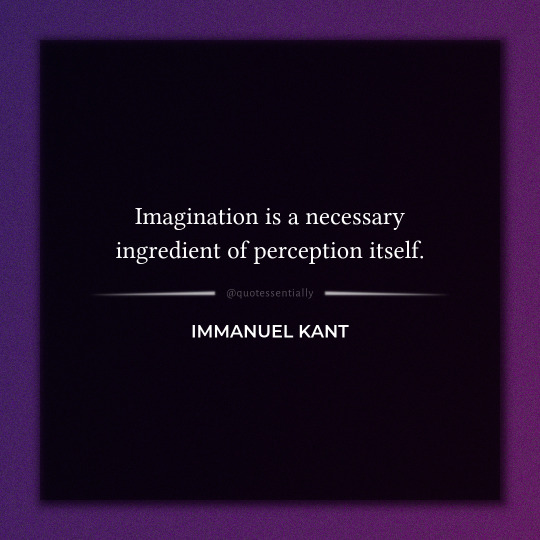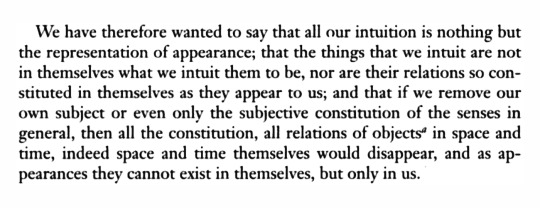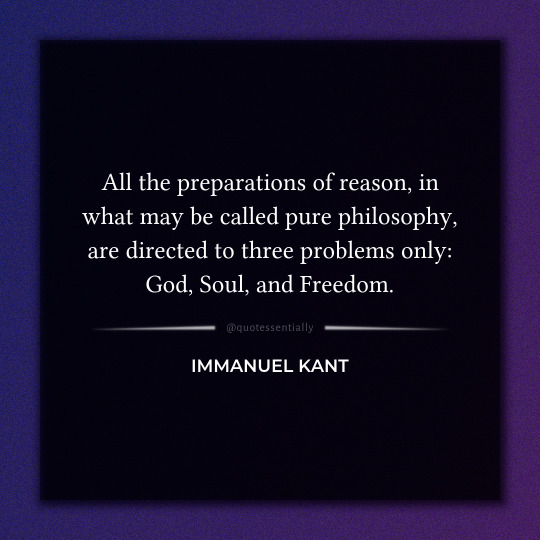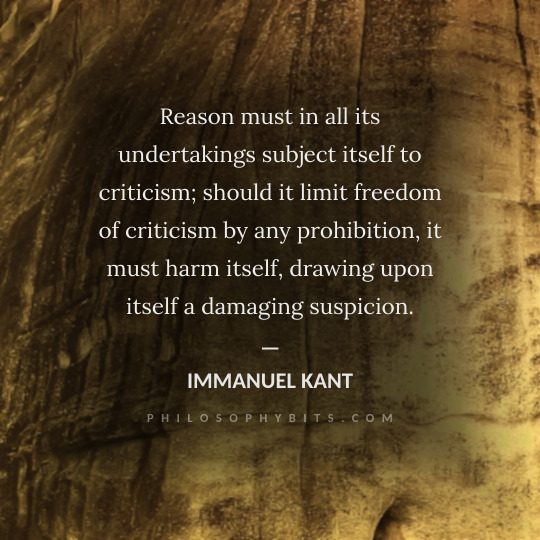#Critique of Pure Reason
Text
Kant talks a lot about common sense for a person that has none at all
#rereading stuff for class#tbh i don’t might kant bc i know how important it is but reading him just feels ridiculous#kant#immanuel kant#enlightenment#enlightenment philosophy#philosophy#critique of pure reason#common sense#insomnia ramblings#textpost#philosophy memes
40 notes
·
View notes
Text

From Immanuel Kant’s Critique of Pure Reason
30 notes
·
View notes
Text

5 notes
·
View notes
Text
*in the doctors voice* It’s not where we are but what may I hope
7 notes
·
View notes
Photo

Immanuel Kant, Critique of Pure Reason
156 notes
·
View notes
Text
at summer camp they explained the old philosophical debate about the possibility of synthetic a priori and i interrupted like "what if it's like — uh, you know, " and then proceeded to come to what they would inform me was the same conclusion as immanuel kants in the critique of pure reason so why does he get all the credit. i was 16 and i thought homestuck was good and i did it so this kant guy sounds overhyped ngl
3 notes
·
View notes
Text
The only pure a priori intuitions are space and time. Space is required for any and all sensation, or any emperical data to exist, because according to Kant, relationally there exists the self and the outside which provides input. Kant also states that “the souls inner state” can be essentially equated to time (Critique of Pure Reason, 77). One might envision these as basic necessary ingredients for our universal experience consisting of two components. We are time, traveling linearly, through space. And in this way, these two revelations surrounding space and time - lead us to the true prerequisites for all experience to occur.
-C.J. Adams
3 notes
·
View notes
Text
Delving into Kantian Philosophy: A Review of "The Critique of Pure Reason" by Immanuel Kant

Immanuel Kant's "The Critique of Pure Reason" stands as one of the most influential and enduring works in the history of philosophy, reshaping the landscape of metaphysics, epistemology, and the philosophy of mind. Published in 1781, this monumental treatise seeks to provide a comprehensive account of the nature, scope, and limits of human knowledge, offering profound insights into the nature of reality, the structure of the mind, and the conditions of possibility for knowledge.
At the heart of "The Critique of Pure Reason" is Kant's revolutionary concept of transcendental idealism, which posits that the mind plays an active role in shaping our experience of the world. Kant argues that the mind imposes certain fundamental concepts and categories—such as space, time, and causality—on our sensory perceptions, organizing them into a coherent and intelligible framework. Through his rigorous analysis, Kant seeks to uncover the a priori conditions that make experience possible, shedding light on the fundamental structures of human cognition.
One of the key themes of "The Critique of Pure Reason" is Kant's distinction between phenomena and noumena, or appearances and things-in-themselves. Kant argues that while we can only know phenomena as they appear to us through the filter of our cognitive faculties, there exists a realm of noumena that lies beyond the reach of human knowledge. This distinction has profound implications for Kant's philosophy, shaping his views on the limits of human understanding and the nature of metaphysical inquiry.
Moreover, "The Critique of Pure Reason" is notable for its meticulous analysis of the nature of space, time, and causality, which Kant identifies as the fundamental categories of human thought. Kant argues that these categories are not derived from experience, but rather constitute the necessary framework through which we interpret our sensory perceptions. By elucidating the synthetic a priori nature of these categories, Kant lays the groundwork for his transcendental idealism and challenges traditional empiricist and rationalist accounts of knowledge.
In addition to its groundbreaking philosophical insights, "The Critique of Pure Reason" is also celebrated for its rigorous methodology and systematic approach to philosophical inquiry. Kant's meticulous argumentation, intricate terminology, and careful exposition of concepts make "The Critique of Pure Reason" a challenging but rewarding read for scholars and philosophers alike. Kant's influence extends far beyond the boundaries of philosophy, shaping the development of disciplines such as psychology, physics, and linguistics, and leaving an indelible mark on the intellectual landscape of the modern world.
In conclusion, "The Critique of Pure Reason" by Immanuel Kant is a towering achievement in the history of philosophy, offering profound insights into the nature of human knowledge, the structure of the mind, and the limits of metaphysical inquiry. Kant's rigorous analysis, groundbreaking concepts, and systematic approach to philosophical inquiry make "The Critique of Pure Reason" a timeless classic that continues to inspire and challenge readers with its depth, complexity, and intellectual rigor.
Immanuel Kant's "The Critique of Pure Reason" is available in Amazon in paperback 24.99$ and hardcover 31.99$ editions.
Number of pages: 516
Language: English
Rating: 10/10
Link of the book!
Review By: King's Cat
#Immanuel Kant#Critique of Pure Reason#Transcendental idealism#Phenomena#Noumena#A priori knowledge#Metaphysics#Epistemology#Synthetic a priori judgments#Space#Time#Causality#Categories of understanding#Rationalism#Empiricism#Skepticism#Transcendental deduction#Transcendental aesthetics#Transcendental logic#Analytic judgments#Synthetic judgments#Appearances#Things-in-themselves#Transcendental unity of apperception#Unity of consciousness#Schematism#Idealism#Rationalist philosophy#Epistemological inquiry#Metaphysical inquiry
0 notes
Text
Delving into Kantian Philosophy: A Review of "The Critique of Pure Reason" by Immanuel Kant

Immanuel Kant's "The Critique of Pure Reason" stands as one of the most influential and enduring works in the history of philosophy, reshaping the landscape of metaphysics, epistemology, and the philosophy of mind. Published in 1781, this monumental treatise seeks to provide a comprehensive account of the nature, scope, and limits of human knowledge, offering profound insights into the nature of reality, the structure of the mind, and the conditions of possibility for knowledge.
At the heart of "The Critique of Pure Reason" is Kant's revolutionary concept of transcendental idealism, which posits that the mind plays an active role in shaping our experience of the world. Kant argues that the mind imposes certain fundamental concepts and categories—such as space, time, and causality—on our sensory perceptions, organizing them into a coherent and intelligible framework. Through his rigorous analysis, Kant seeks to uncover the a priori conditions that make experience possible, shedding light on the fundamental structures of human cognition.
One of the key themes of "The Critique of Pure Reason" is Kant's distinction between phenomena and noumena, or appearances and things-in-themselves. Kant argues that while we can only know phenomena as they appear to us through the filter of our cognitive faculties, there exists a realm of noumena that lies beyond the reach of human knowledge. This distinction has profound implications for Kant's philosophy, shaping his views on the limits of human understanding and the nature of metaphysical inquiry.
Moreover, "The Critique of Pure Reason" is notable for its meticulous analysis of the nature of space, time, and causality, which Kant identifies as the fundamental categories of human thought. Kant argues that these categories are not derived from experience, but rather constitute the necessary framework through which we interpret our sensory perceptions. By elucidating the synthetic a priori nature of these categories, Kant lays the groundwork for his transcendental idealism and challenges traditional empiricist and rationalist accounts of knowledge.
In addition to its groundbreaking philosophical insights, "The Critique of Pure Reason" is also celebrated for its rigorous methodology and systematic approach to philosophical inquiry. Kant's meticulous argumentation, intricate terminology, and careful exposition of concepts make "The Critique of Pure Reason" a challenging but rewarding read for scholars and philosophers alike. Kant's influence extends far beyond the boundaries of philosophy, shaping the development of disciplines such as psychology, physics, and linguistics, and leaving an indelible mark on the intellectual landscape of the modern world.
In conclusion, "The Critique of Pure Reason" by Immanuel Kant is a towering achievement in the history of philosophy, offering profound insights into the nature of human knowledge, the structure of the mind, and the limits of metaphysical inquiry. Kant's rigorous analysis, groundbreaking concepts, and systematic approach to philosophical inquiry make "The Critique of Pure Reason" a timeless classic that continues to inspire and challenge readers with its depth, complexity, and intellectual rigor.
Immanuel Kant's "The Critique of Pure Reason" is available in Amazon in paperback 24.99$ and hardcover 31.99$ editions.
Number of pages: 516
Language: English
Rating: 10/10
Link of the book!
Review By: King's Cat
#Immanuel Kant#Critique of Pure Reason#Transcendental idealism#Phenomena#Noumena#A priori knowledge#Metaphysics#Epistemology#Synthetic a priori judgments#Space#Time#Causality#Categories of understanding#Rationalism#Empiricism#Skepticism#Transcendental deduction#Transcendental aesthetics#Transcendental logic#Analytic judgments#Synthetic judgments#Appearances#Things-in-themselves#Transcendental unity of apperception#Unity of consciousness#Schematism#Idealism#Rationalist philosophy#Epistemological inquiry#Metaphysical inquiry
0 notes
Text
y’all I’m actually not at all certain wether Kant wanted to metaphysically legitimise Newtonian physics …
0 notes
Text
i cannot fucking wait for this show to be over so i never have to think about this shitty company ever again
#the show will be ours now. they abandoned it#ftr i think the idea that rvb 'should have ended' at any point is stupid. rvb is a show that can run in perpetuity if you have good writers#i think 'it shouldve ended' is a very lazy critique. its one thats been lobbied against rvb since the end of season 5#if later seasons have problems its not because the show went on too long. its because the writing was poor#and saying that 'it shouldve ended' is saying that a decline in quality is inevitable.#and that both lets the bad writing off the hook and condescends to the writers.#this has become. a comepletely different conversation.#well i just wanted to clarify. i am happy its ending for purely political reasons. in a perfect world i would keep getting more rvb foreve
38 notes
·
View notes
Text

From Immanuel Kant’s Critique of Pure Reason
6 notes
·
View notes
Text

19 notes
·
View notes
Text
yes it is a slay but does it comply with the categorical imperative
#have you considered: kant?#immanuel kant#kant#categorical imperative#enlightenment#enlightenment philosophy#the critique of pure reason#mine#dark academia#philosophy textpost#philosophy memes#3 am thoughts
18 notes
·
View notes
Note
RAHHGHGHGH . so glad i can finally be fucking insane in the membrane abt dutch without spoilering . i know hes not ur guy from this one but hes such a fucking beast to me i need to put him in the salad spinner and watch him go .
his like subtle manipulation of everyone , particularly arthur, john and molly. oh my god i could talk for england abt molly oshea. dutch's romantic relationships are like a microcosm of how his manipulation and favour with arthur / john plays out over the course of the game . he was originally with susan grimshaw ( rip to the goat ) , then it's heavily implied he did her extremely dirty and ditched her for molly, a aristrocratic but crucially younger and less experienced woman who better embodied his big , grand ideas ( oh motif of dutch surrounding himself by rich lovely things. like his clothes . ostensibly pretty extravagant for an outlaw but when you get closer you see how ripped and frayed they are , representing him clinging onto a lost way of life ). THEN at several points in the game if you explore camp , you can see dutch flirting with karen multiple times !!! karen who is like NINETEEN i think ??
hes such a fucking scumbag . he does not get attached to people in the normal way . he views them as extensions of his pretentious beliefs . he preys on young, vulnerable people with nothing to lose, offering them a home , a family , only to use it against them when they start waking up to the reality. and it hurts so much watching arthur come to this realisation because he loves dutch so goddamn much , he sticks around for wayyyy longer than he should've because he's loyal down to his fucking core .
sidenote sorry for being insane . dutch has my fav speech in the whole game which is his one to milton ... 'ain't no such thing as civilised. it's man so in love with greed, he has forgotten himself and found only appetites ' ohhh dutch ur so silly dont u want to introspect a little . arent u tired of projecting . dont u just wnana go apeshit.
i know a lot about dutchs story through osmosis from beloved lamb and you are SO right that his relationships with women (particular his trading in of women for younger models whenever he so feels like it) is a microcosm of how he manipulates people in the game !!! it always baffles me when i remember that dutch was with grimshaw once upon a time and it feels . so apt to think that it would later be grimshaw to kill her, especially in the midst of the crisis of the gang falling apart.
i LOVEEE the motif of dutchs obsession with luxury - unaffordable luxury. its such a great way to subtly represent his greed that will eventually kill him. not only is it present in his appearance, but its really the most impactful when held up with how hosea dresses himself. hosea is such an important anchor to the gang, and an important part of leveling dutch overall. i really like that element and that hosea dresses primarily in blue while dutch does in red... i love the way the honor system uses color because once you see it you cannot Unsee it and it makes me insane
and i think that obsession with the finer things and also his consistent preying on the young and vulnerable and how he groomed arthur and john into violece is once again.... sooo representative of the fact that dutchs main sin is a deep pride and a sense of arrogance. he DOES believe that all people in the gang are some extension of his bullshit philosphy and he views his love (which i do believe he views as genuine love) as holy and righteous...dutch believes himself to know best. better than anyone, for everything. whether that be in clothes or how to live and act. his prestige is so ... fake... he is SO fake. he has constructed an entire life upon a falsity and false understanding and he's sold it time and time again to recruit members. and he does it so well that it drives the gang to obsess over loyalty and dutchs word as law.
the only thing that was tempering that for so long was hosea. hosea was the voice of reason. hosea was the counter. and when hosea inevitably dies - dutch completely slips and sinks further and further into his unethical tirade. but dutch still has some humanity in him, and everything snaps back to reality when arthur dies in front of him and it is all dutch's fault in some capacity. its the one time in the game where dutch is forced to reflect inward, because he did love arthur. he did. i know he did. and that is precisely why he leaves arthur there alone - because he is then forced to face every single reality all at once when arthur dies like that. and it is so .so .
#return to sender#i have to stop yapping im so sorry about this but god. arthurs love for dutch is so pure and true. theres such true belief in it#dutchs love for arthur is less pure but i do think he did love arthur. he did and thats the worst part to me.#he is a complete scumbag. a selfish and worthless piece of shit with no capacity for being critiqued#but he is so nuanced at the same time. i need to play the game 6 more times.#DO NOT GET ME STARTED ON HIS PROJECTING WHEN HE SPEAKS TO ENEMIES#THE O DRISCOLLS...THE PINKERTONS#i believe so sincerely that the only reason dutch specifically killed angelo bronte was because bronte called him exactly for what he is#and he couldnt STAND that#a.rdr2
6 notes
·
View notes